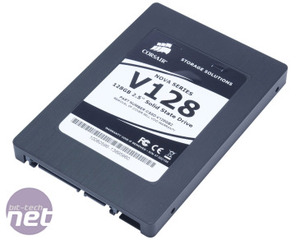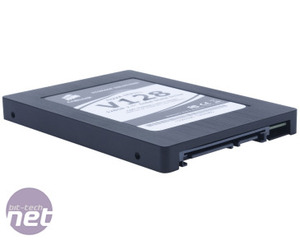Results Analysis
As with the G.Skill Falcon 2, the combination of the Indilinx Barefoot Eco drive controller and 32nm Intel NAND gave it a boost when it came to sequential read and write performance, The Corsair Nova delivered impressive speeds of 244MB/sec read and 180MB/sec write when new, which dropped to 227MB/sec and 175MB/sec following heavy use and TRIM. Access times as measured by AS SSD were also good at 0.134ms read and 0.451ms write, although the Intel drive controller still rules the roost in these tests.Sequential speeds as measured by ATTO were solid too, with the Nova marginally outperforming the OCZ vertex (and its combination of original Indilinx Barefoot controller and Samsung NAND memory) at 4KB read and write and performing just as well with 64KB and 1,024KB files. The read speed of the Nova when dealing with 1,024KB files peaked at a whopping 265.3MB/sec – close to the 270MB/s maximum read speed claimed by Corsair.
Random performance was also good, with the Nova matching the Falcon 2’s random read speed of 38MB/sec and random read access time of 0.3ms. These results are still somewhat off the 63MB/sec random read speeds of the Intel X25-M 160GB, which is mighty when dealing with random reads and writes. Random write performance was merely capable, with a random write speed of 7.7MB/sec and an average random write latency of 1.51ms.
Finally the Nova 128GB delivered a suitably nippy Windows 7 boot time of 33 seconds – in line with the other Indilinx-powered drives, and just a second slower than the Intel X25-M 160GB. The Nova booted Windows in twice the speed of our hard disk of choice, the 1TB Samsung Spinpoint F3.
Despite us writing over 1TB of data to the drive, the TRIM function of the drive’s firmware allowed the Nova to retain practically all its ‘as new’ performance throughout our testing. Only the sequential performance as measured in AS SSD showed any sign of performance degradation, and even then only by a small amount.
Conclusion
The Corsair Nova 128GB is another solid showing from an Indilinx-powered SSD; while there’s not a huge jump in performance from last year’s Indilinx Barefoot drives. Compared to standard Indilinx Barefoot SSDs that use the 40nm Samsung NAND (such as the OCZ Vertex and Corsair X-series) the Nova is faster when it comes to sequential read and write speeds, but a touch slower in some random read and write situations. Overall, we’d say that the Nova is overall a touch faster than these older SSDs.Pricing still remains the biggest stumbling block for SSDs though, with the £277.95 for 120GB of useable storage equating to £2.31/GB. This is unlikely to sway those waiting for a more palpable SSD price cut, for which we’ll likely have to wait for 20nm NAND. However, the Nova does at least offer a £10 saving over the OCZ Vertex 120GB, which costs £290. Considering that the Nova is, if anything, slightly faster than the Vertex, it’s the Nova that’s the better buy.
While the technically identical G.Skill Falcon 2 is listed at etailers for a much cheaper £243.99, G.Skill has struggled to deliver enough stock to meet demand, making the Falcon 2 harder to find in stock than a bag of Mini Eggs a month after Easter.
All of which means the Corsair Nova comes out rather well on the balance of things. While not as aggressively priced as it perhaps could be, it’s still a little cheaper than the existing Indilinx Barefoot drives on the market and delivers plenty of performance. However, the Barefoot Eco controller is only an incremental update and doesn’t push SSD technology onto the next level. For that we’ll have to wait until we see SandForce controllers and Micron’s new drives. Stay tuned!
- Features
- x
- x
- x
- x
- x
- x
- x
- x
- x
- -
- 9/10
- Performance
- x
- x
- x
- x
- x
- x
- x
- x
- x
- -
- 9/10
- Value
- x
- x
- x
- x
- x
- x
- x
- x
- -
- -
- 8/10
- Overall
- x
- x
- x
- x
- x
- x
- x
- x
- -
- -
- 8/10

Corsair Nova 128GB SSD

MSI MPG Velox 100R Chassis Review
October 14 2021 | 15:04











Want to comment? Please log in.